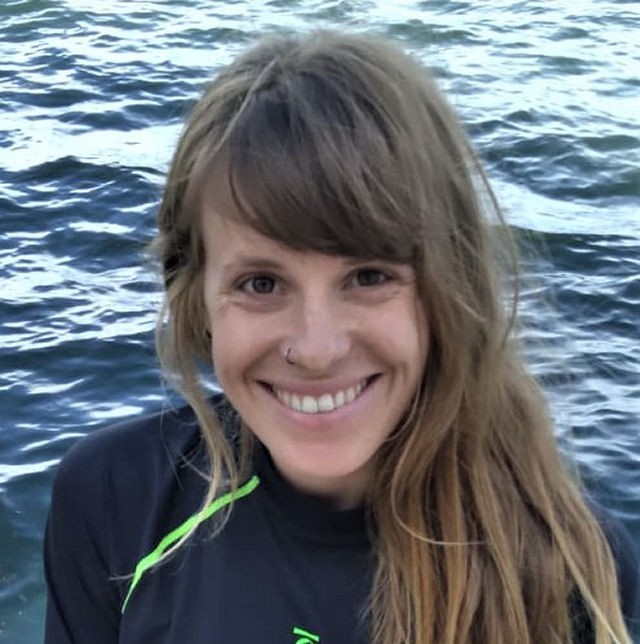
Research Highlights
Research Interests
Coral reef ecology, carbonate chemistry, and biogeochemical processes.
Alice E. Webb, Ph.D.
Coral Carbonate Budget Post-Doctoral Associate (University of Miami/CIMAS), Ocean Chemistry and Ecosystems Division
Google Voice 786.708.5611
4301 Rickenbacker Causeway
Miami, Florida 33149
“Life, uh, finds a way.” Dr Ian Malcolm 1993
Dr. Webb’s research integrates ecological, metabolic, and biogeochemical data to understand how marine organisms interact with their environment. Specifically, she is interested in the mechanisms and rates of carbonate accretion and dissolution by benthic communities in response to global (warming and acidification) and local (eutrophication and pollutants) stressors. She uses a wide range of analytical techniques combined with in situ experiments for holistic assessments of community-wide functional responses to environmental change.
Current Work
Currently, I am working on developing a modelling approach to forecast future habitat persistence along the Florida Keys and Puerto Rico by incorporating site-specific climate projections and coral adaptive capacity into future trajectories of reef habitat persistence. I am also building an evaluative, web-based and easily interpretable tool to translate carbonate budgets into a climate-relevant management tool for forecasting habitat persistence. The goal of this project is to allow managers to: 1) determine if their reef(s) are presently eroding or accreting, structurally complex, and if/when they may become erosional in the future with climate change and ocean acidification, and 2) assess the possible efficacy of counteractive measures to maintain reef structure.
2019, PhD, Royal Netherlands Institute for Sea Research, Netherlands
2012, M.Sc Oceanography, University of Southhampton, United Kingdom
2010, B.Sc Hons Marine Biology, University of St Andrews, United Kingdom
- Webb, A.E., A.M. Palacio-Castro, K. Cooke, K.R. Eaton, B. Chomitz, N. Soderberg, M. Chakraborty, Z. Zagon, A. Boyd, P.M. Kiel, A. Demerlis, C.T. Perry, and I.C. Enochs. Rubble persistence under ocean acidification threatened by accelerated bioerosion and lower-density coral skeletons. Global Change Biology, 30(6):e17371, https://doi.org/10.1111/gcb.17371 2024
Ref. 4423 - Palacio-Castro, A.M., I.C. Enochs, N. Besemer, A. Boyd, M. Jankulak, G. Kolodziej, H.K. Hirsh, A.E. Webb, E.K. Towle, C. Kelble, I. Smith, and D.P. Manzello. Coral reef carbonate chemistry reveals interannual, seasonal, and spatial impacts on ocean acidification off Florida. Global Biogeochemical Cycles, 37(12):e2023GB007789, https://doi.org/10.1029/2023GB007789 2023
Ref. 4371 - Webb, A.E., I.C. Enochs, R. van Hooidonk, R.M. van Westen, N. Besemer, G. Kolodziej, T.S. Viehman, and D. Manzello. Restoration and coral adaptation delay, but do not prevent, climate-driven reef framework erosion of an inshore site in the Florida Keys. Scientific Reports, 13:258, https://doi.org/10.1038/s41598-022-26930-4 2023
Ref. 4212
Webb, A.E., de Bakker, D.M., Soetaert, K., da Costa, T., van Heuven, S.M., van Duyl, F.C., Reichart, G.J. and de Nooijer, L.J. (2021). Quantifying functional consequences of habitat degradation on a Caribbean coral reef. Biogeosciences, 18(24), 6501-6516.
Webb, A. E., Engelen, A. H., Bouwmeester, J., van Dijk, I., Geerken, E., Lattaud, J., Engelen, D., de Bakker, B.S., & de Bakker, D.M. (2021). Synchronized broadcast spawning by six invertebrates (Echinodermata and Mollusca) in the north-western Red Sea. Marine Biology, 168(5), 1-6.
Achlatis, M., van der Zande, R. M., Webb, A. E., de Bakker, D. M., de Nooijer, L. J., & de Goeij, J. M. (2021). Photosynthetically stimulated bioerosion in symbiotic sponges: the role of glycerol and oxygen. Coral Reefs, 40(3), 881- 891.